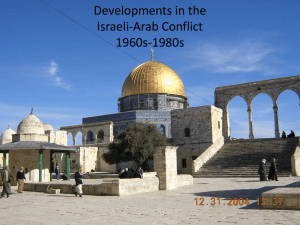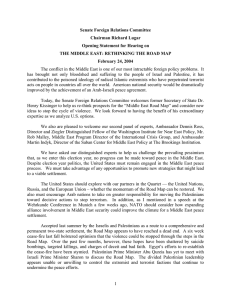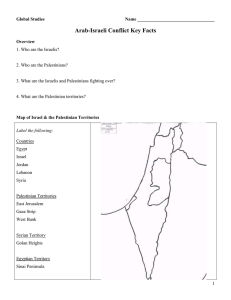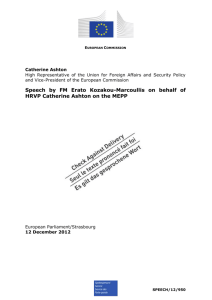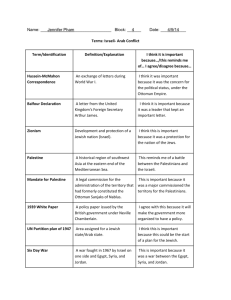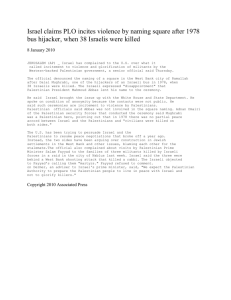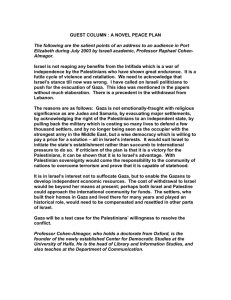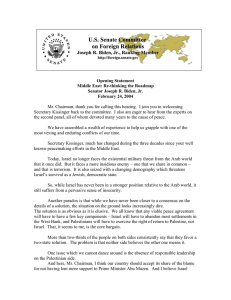Opening Statement Senator Joseph R. Biden, Jr.
advertisement
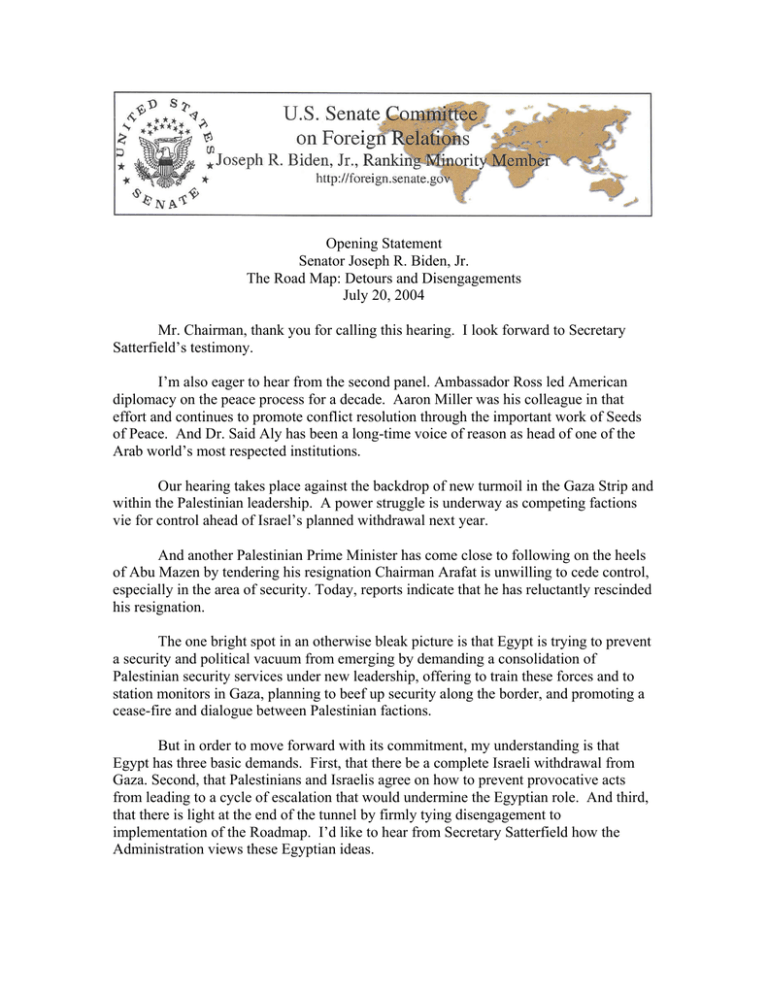
Opening Statement Senator Joseph R. Biden, Jr. The Road Map: Detours and Disengagements July 20, 2004 Mr. Chairman, thank you for calling this hearing. I look forward to Secretary Satterfield’s testimony. I’m also eager to hear from the second panel. Ambassador Ross led American diplomacy on the peace process for a decade. Aaron Miller was his colleague in that effort and continues to promote conflict resolution through the important work of Seeds of Peace. And Dr. Said Aly has been a long-time voice of reason as head of one of the Arab world’s most respected institutions. Our hearing takes place against the backdrop of new turmoil in the Gaza Strip and within the Palestinian leadership. A power struggle is underway as competing factions vie for control ahead of Israel’s planned withdrawal next year. And another Palestinian Prime Minister has come close to following on the heels of Abu Mazen by tendering his resignation Chairman Arafat is unwilling to cede control, especially in the area of security. Today, reports indicate that he has reluctantly rescinded his resignation. The one bright spot in an otherwise bleak picture is that Egypt is trying to prevent a security and political vacuum from emerging by demanding a consolidation of Palestinian security services under new leadership, offering to train these forces and to station monitors in Gaza, planning to beef up security along the border, and promoting a cease-fire and dialogue between Palestinian factions. But in order to move forward with its commitment, my understanding is that Egypt has three basic demands. First, that there be a complete Israeli withdrawal from Gaza. Second, that Palestinians and Israelis agree on how to prevent provocative acts from leading to a cycle of escalation that would undermine the Egyptian role. And third, that there is light at the end of the tunnel by firmly tying disengagement to implementation of the Roadmap. I’d like to hear from Secretary Satterfield how the Administration views these Egyptian ideas. 2 Mr. Chairman, the solution in the Middle East is as obvious as it is elusive. We all know that any viable peace agreement will have a few key components – Israel will have to abandon most settlements in the West Bank, and Palestinians will NOT be able to exercise the right of return to Israel, but to Palestine. That, it seems to me, is the core bargain. More than two-thirds of the people on both sides consistently say that they favor a two-state solution. The problem is that neither side believes the other one means it. Events in recent days demonstrate that the main obstacle to peace is the absence of responsible Palestinian leadership. But the unprecedented challenge to Chairman Arafat’s leadership may offer a possible opening to advance key political and security reforms which are critical to getting the peace process back on track. Last year, our country and Israel missed another opportunity, in my view, by not supporting Prime Minister Abu Mazen more actively. Clearly, he was prepared to challenge Arafat, but at the end of the day he was discredited by his inability to deliver any improvement in the lives of ordinary Palestinians. That suited Mr. Arafat fine -- for he seems to thrive on the suffering of his own people. Mr. Chairman, the direction the Israeli-Palestinian conflict takes will have a direct bearing on the key strategic issues our country faces – from the war on terrorism, to the promotion of democracy, to success in Iraq. The stakes are very high. Yet I don’t see a commensurate level of urgency, nor sustained and consistent involvement from the Bush Administration. My hopes were raised last year when the President traveled to the Middle East and put his personal prestige on the line. He appointed a diplomat to “ride herd” on the process. He cajoled, he rallied, and, yes, he even bullied. And I supported him in all his efforts. For a few short months there was hope and progress. But then, the interest level seemed to wane, and the Middle East -- which presents a formidable challenge to even full-fledged peace efforts -- overwhelmed what soon became a half-hearted effort. Ever since, instead of American leadership creating new opportunities, events on the ground have driven our policy. Prime Minister Sharon took a bold initiative with the Disengagement Plan; Egypt steps in and works on a plan to fill the vacuum. Where is American diplomacy? It is not as if we have the luxury of time. Iraq’s new government is struggling to establish its authority in the face of violence that continues unabated. Democracy promotion in the Middle East appears to be stuck as two regional players -- Egypt and Saudi Arabia -- stayed away from the G-8 summit. And the terrorists have found a goldmine of recruiting in the discontent and anger that spans the Arab and Muslim worlds. 3 We have to view the Arab-Israeli conflict in the context of this volatile strategic climate. And it explains why making progress has never been more important. I am not suggesting that there is an easy solution to the Arab-Israeli conflict. If there were, it would be resolved by now. Nor am I suggesting that American leadership alone can solve it. The Arab states, the Palestinians, our European friends, and the Israelis must step up to the plate, and they haven’t thus far, in my view. But only American leadership can help synchronize these efforts and begin to move this gigantic rock up the hill again. Promoting peace and securing Israel require hard work – day in and day out – as our witnesses can attest. Benign neglect punctuated by episodic engagement imperils American strategic interests in the region. We have no choice but to be involved. The central question I will ask of all the witnesses is: to what degree and how should we be involved. What should we be doing pro-actively that we are not doing now. I look forward to hearing the testimony.

